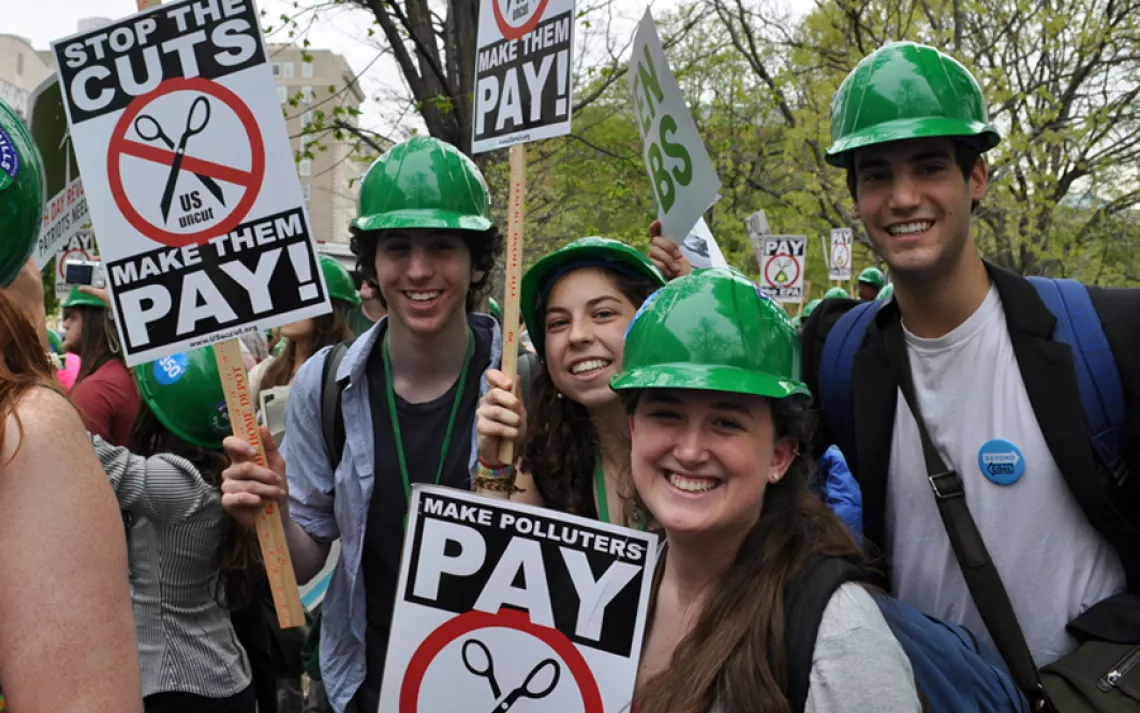College Kids Pressure Corporations Into Climate Action
Could demand from the talent pool be what it takes?
The climate crisis is upon us, and Bill Weihl, the man largely credited with Google’s carbon-neutrality achievement, thinks it's high time for corporations to start putting their money behind real climate action. Companies like CVS Health and ExxonMobil have publically acknowledged the danger posed by our changing climate but have done little more than making public statements. Lobbying dollars tell a different story: ExxonMobil and other leading fossil fuel companies have spent $1 billion blocking climate action since the signing of the Paris Agreement.
Weihl made a name for himself working on sustainability issues for Google and Facebook but left the private sector in 2018 with the opinion that he could do more from the outside to push businesses to take action on climate. Two years later, he founded Climate Voice. Taking inspiration from the struggle for LGBTQ rights in the corporate landscape, Weihl suspected that employees and college students (i.e., the talent pool companies strive to attract) could be the key to pushing corporations that say they support climate action to actually spend money and create policy.
“Companies have a lot of influence in our political system, and when it comes to climate policy, they mostly don’t use it,” Weihl told Sierra. “I should say, the climate-friendly companies mostly don’t use it. The guys on the other side use it all the time.”
It is no secret that corporations play an outsize role in American politics, using campaign contributions, professional lobbyists, political action committees, and economic development to express their disapproval or displeasure with laws and lawmakers. Weihl says corporations usually use these political tools to increase their profits through tax breaks or subsidies and rarely use them to promote climate action.
When Amazon courted 238 cities to find a location for its new headquarters, for instance, the $1.14 trillion company received offers with tax incentives ranging from millions to billions of dollars.
“They did not say we're going to prioritize a locale that is leading on climate action,” Weihl says. “If they had, it would have sent a very strong signal to cities and states, that if they want economic development, they are going to have to get their act together on climate.”
In a self-assessment entitled “All In: Staying the Course on Our Commitment to Sustainability,” Amazon reported that it has made “ambitious commitments” on climate.
But commitments without accountability to back them up have a long history of not solving climate change. Weihl thinks pressure for real action could come from the bottom up.
Tessa Weiss was in her senior year of a mechanical engineering program at MIT when she met Weihl at a climate conference. She had been involved in efforts to get MIT to divest from fossil fuels and believed in Weihl’s theory of change—that if companies wouldn’t take action on their own, pressure from the labor pool could encourage them.
“Companies are actively looking for the best talent. They will respond if people who want to work there, and employees who already work there, are asking about climate,” Weiss says. “We want to make sustainability something that people expect from companies.”
When she got back from the conference, Weiss started reaching out to fellow students at MIT, asking if they would help push companies toward taking action on climate policy. Right now, Climate Voice is trying to show employers that climate change is something their labor force is serious about. For students, that means pledging to ask employers what specific actions they are taking on climate during interviews and at career fairs, and if they have the option, taking jobs only with companies that are actively working on climate solutions. According to Weiss, many of the students she speaks with say they’ve been looking for something like Climate Voice for a while.
Weihl says it is “almost unheard of” for companies to lobby for climate action, but he’s hopeful that they can be pushed in the right direction. He points to some companies that increased advocacy for LGBTQ rights policy, strictly due to internal employee pressure.
“If you go back 10 years ago, you had companies that were very progressive on LGBTQ rights in their own operations and internal policy, but they were mostly silent on public policy,” Weihl explains. “By five years ago, you had hundreds of companies that were quite vocal on LGBTQ policy.”
And, it worked. When Indiana passed the Religious Freedom Restoration Act in 2015, which allowed businesses to refuse to serve customers based on their sexual orientation, for instance, Salesforce threatened to reduce spending in the state. When North Carolina passed its bathroom bill, which discriminated against trans people, PayPal and other businesses canceled new developments in the state. The Indiana law was amended, and the North Carolina law was repealed.
“All the companies that spoke up on those issues, what moved them from working internally to advocating for public policy was hearing from their employees and believing that college students had hit the point where for them, it was a no-brainer civil rights issue,” Weihl says. “If they were seen as complicit, they would have a hard time countering that narrative, and that would make it harder to hire.”
Weihl wants to replicate that dynamic shift for climate change. He wants companies to know that if they don’t take action on climate, it will be harder to keep the employees they have, or to hire new ones.
The next step for Climate Voice: help students and employees know who isn’t doing their part. The nonprofit will be calling out specific companies this fall through social media campaigns.
Weihl sums it up: “If we get specific, it affects their reputation.”
 The Magazine of The Sierra Club
The Magazine of The Sierra Club




